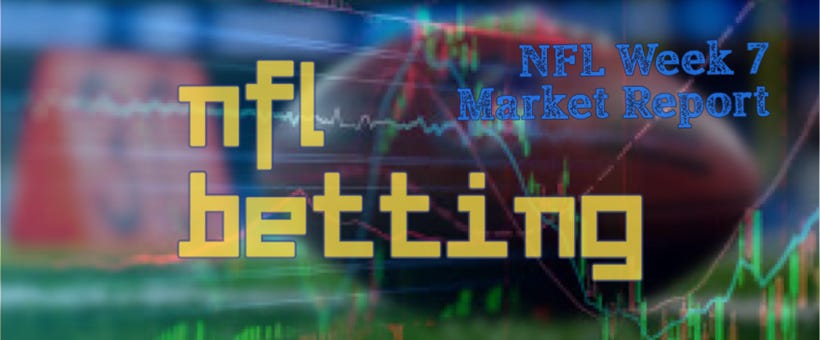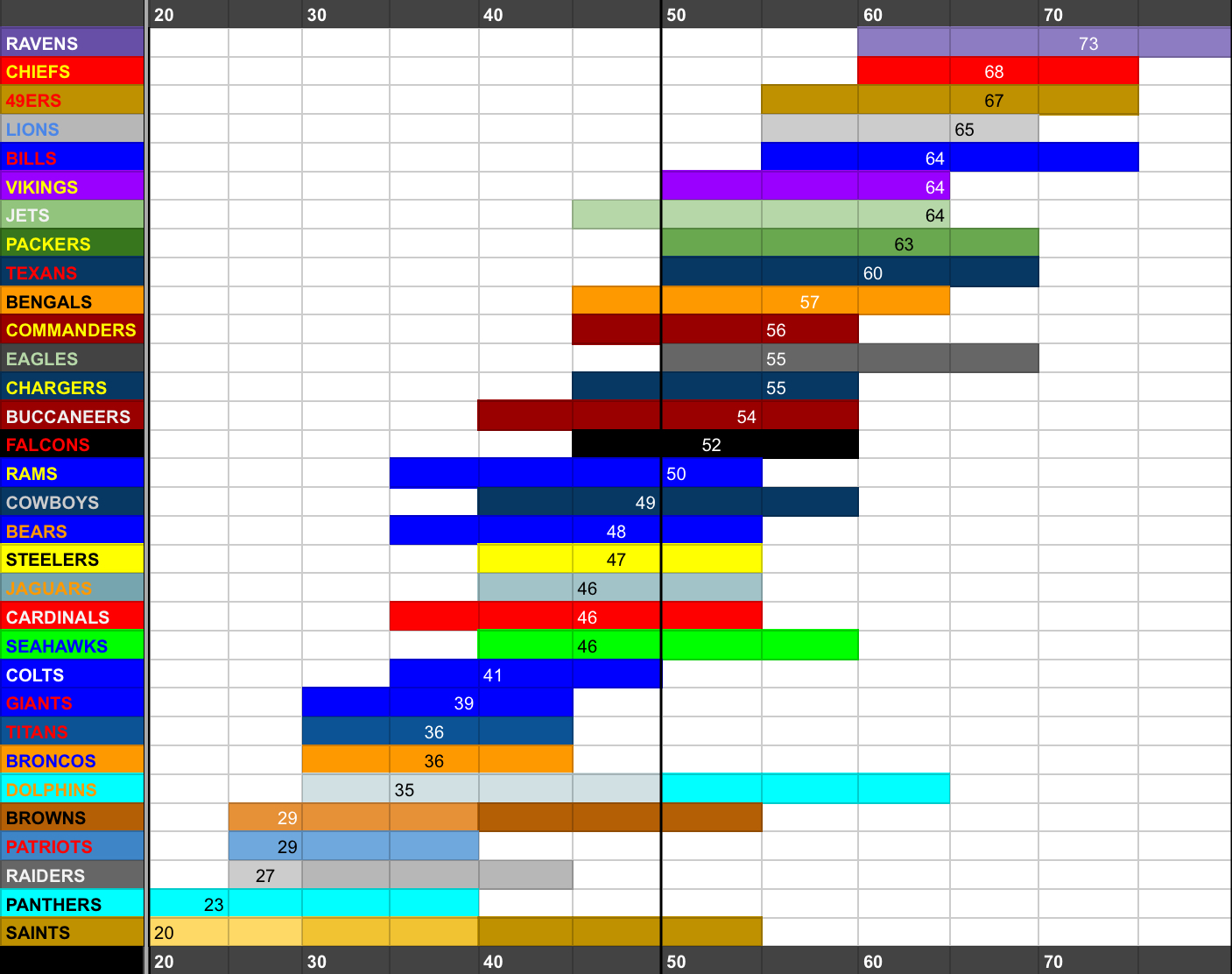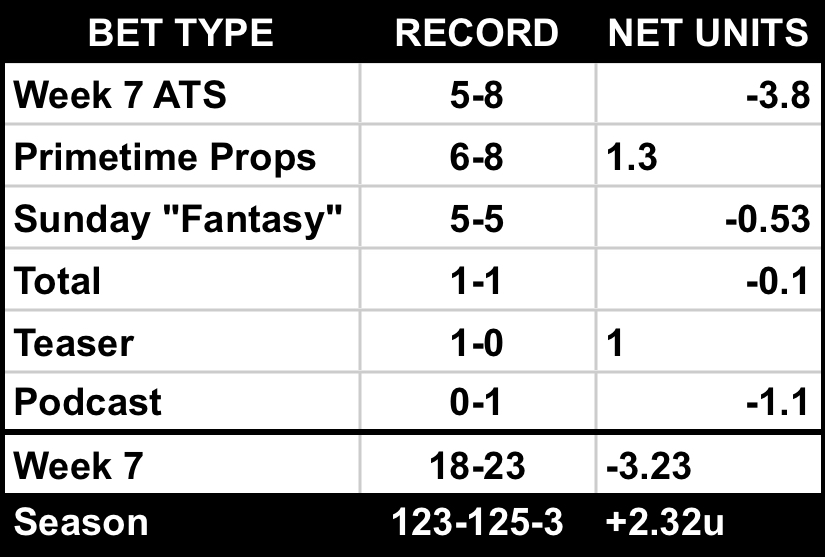Matt Russell is the creator of THE WINDOW, and former lead betting analyst at theScore. If there’s a bad beat to be had, Matt will find it. You can find him @mrussauthentic on X.
If you were looking for an underdog of more than a field goal to win outright, Week 7 - like Week 6 before it - was not the place to find it. Hindsight being 20/20, the Lions and Chiefs qualifying as underdog winners seems like it should have been something more obvious to profit on. Elsewhere, the Raiders, Texans, Steelers and Cardinals covered, if not won outright, in games where their opponent held a rating that was higher than it had been all season.
For a breakdown of Week 7 and all the betting takeaways, check out the Tuesday episode of THE WINDOW: Sports betting podcastEstimated market ratings
Before the season, we explained the process of how the betting market takes the first odds offered from sportsbooks about a team’s quality - regular season win (RSW) totals - and translates that into a team rating.
Each game provides a subsequent data point that we receive from oddsmakers and bettors alike - the closing line (the last available point spread to bet before kickoff).
Taking the most recent game’s closing line into account, we adjust every team’s market rating to reflect where they were relative to the rest of the league before the previous week’s games.
These are not power rankings - a largely pointless exercise done for clicks - that simply list each team in a made-up order for readers to argue about.
They are ratings, which allow for the possibility that teams can be perceived to be equal - or have a large gap - amongst the other 31 teams in the NFL. To better understand the chart above, refer back to Week 1’s market rating column. You can argue about them, OR you can just bet against them.
Week 7 started with the market treating the Saints like the worst team in the league - and New Orleans then performing like it. The reason, of course, was that the Saints were suiting up a preseason-esque roster. It’s when a rating drops without that drastic of an injury situation where we’ll want to fade that move.
The Rams were quietly the most interesting case for our tracking of how the betting market rates teams. Los Angeles had a low rating heading into Week 5, which we had to carry over through their Week 6 bye. Leading into Week 7, the big story was the status of a return for Cooper Kupp, and the increase in the Rams’ rating (listed above) assumes that he was going to play against the Raiders. Only he didn’t. Yet, the line didn’t come off of -7. Controversially, it took Antonio Pierce opting for a spread covering field goal late, but +7 was a valuable bet once Kupp was ruled out and the line didn’t react accordingly.
Chiefs-49ers was the game of the week, but it didn’t live up to the hype. Rated close to equally for the last few seasons (depending on the week), San Francisco had little chance to play to their rating with Deebo Samuel coming down with pneumonia (and Christian McCaffrey still out). Throw in Brandon Aiyuk’s season-ending injury, and you’ve got a team that’s a shadow of their former selves.
The Lions and Vikings played an instant-classic, while the Bills proved they’re still a second-tier contender in the mid-60s, and… oh God, what are the Jets doing here!?!
New York traded for Davante Adams and went from being rated as an average team that just lost their “new coach bump” game to on the echelon of actual contenders. Adams caught three passes for 30 yards. Unsurprisingly, the Jets didn’t live up to market expectations on Sunday night. It’s possible a line move to where the Jets were as high as -3, was also built on a fade of Russell Wilson, but that was a mistake as well.
After a pair of covers as a favorite, the Packers got enough attention to push them out to -3 against the Texans. If we pretend like it was destiny that Green Bay would win by two points, their rating is why they didn’t cover, since the line for this game would have been -1.5 just a week ago.
The Commanders lost Jayden Daniels early against the Panthers, but it wasn’t remotely a problem against the Panthers. If you rated Carolina down at 20/100, like the preseason-roster Saints, who would argue with you?
The Seahawks finally showed up and played to the high side of their range. Improved health and rest is one reason, but so is the urgency of having lost four consecutive games. In turn, the Falcons came in without that same motivation and it showed.
A lot went on in Cleveland on Sunday. The Browns gave up a game-opening kickoff return touchdown, which put a potentially valuable bet on Cleveland behind the 8-ball immediately. Deshaun Watson had the season-ending injury that Browns’ ownership seemed hopeful for, but Jameis Winston needed a second injury - to Dorian Thompson-Robinson - to finally get in the game, and he led a rare touchdown drive for Cleveland. How the Browns’ rating changes post-Watson will be more than a little interesting.
The Chargers’ rating crept up, while the Cardinals got knocked down, and a game lined like a coin flip was 50/50 right to the end.
The Ravens still lead the way in the market ratings, closing Week 7 by asserting their regular season dominance. How far the Bucs’ rating falls, without their star receivers, will be interesting to see before their rematch with the Falcons.







